LESOTHO POPULIST









The 2024 general elections are under threat of not being credible and fair, says Defend Our Democracy.
It says the threat can only be halted by President Cyril Rama phosa, who could refuse to sign into law the Electoral Amendment Bill and refer it back to Parliament for further input, or to the Consti tutional Court for a confirmation order of the constitutionality of the legislation.
If the bill is challenged in court on the basis of fairness, elections
could be delayed as the Electoral Commission of SA (IEC) has indi cated that it would require about 18 months to prepare for the elections.
According to Defend Our Democ racy, the bill is profoundly flawed and a “sham”. The civil society organisation advanced this view on Monday as it made an impassioned plea to Members of Parliament and Ramaphosa to reject the bill.

Parliament has been racing to finalise the details for the new electoral dispensation following a landmark Constitutional Court rul ing two years ago that independent candidates could participate in pro vincial and national elections. The

court gave Parliament two years to effect the necessary changes.
“Now, with months before the Constitutional Court deadline to finalise the bill, we believe that Par liament is putting at risk the 2024 elections. The 2024 elections must accommodate independent candi dates and the IEC has to have time to prepare for it. But instead of con sidering an option that is viable for the country, Parliament has instead gone for a flawed model which can be legally challenged.
“We therefore reiterate our call to MPs to vote no. We call on Pres ident Cyril Ramaphosa to not sign off this sham of a bill,” Defend Our
Democracy said in a statement.
The Constitutional Court has given Parliament until the start of December to finalise the bill and Ramaphosa until 10 December to sign it off.
If the bill is passed, prospective candidates will be subject to strin gent guidelines, including that can didates will have to garner just over 8,000 voter signatures to be eligible.

Political parties currently require 1,000 signatures to register with the IEC.
Experts and civil society organi sations have taken issue with this, slamming it as an unfair practice.
However, Home Affairs Minister

Aaron Motsoaledi has repeatedly told Parliament that guidelines need to be tough to establish which can didates are serious and have a solid support base.
Defend Our Democracy would not say whether it would approach the courts should MPs and Rama phosa forge ahead with the bill. Neeshan Balton from the Ahmed Kathrada Foundation, however, confirmed that: “Work has already started around it; when the time is right, I think we will come up with those details.”

Defend Our Democracy has accused Parliament of rushing to pass the bill even though it is unfair. It is calling for changes to the vot ing system that will benefit voters and allow the public to hold MPs accountable, but insists that it does not want to see the elections post poned.
“If they pass this bill, and it is then challenged in court because it is unfair, this will delay the IEC further in preparing for the 2024 elections. We don’t want the 2024 elections to be delayed, so Parlia ment needs to listen to us now about making fair and credible changes to the electoral system.”
However, advocate Mojanku Gumbi from Defend Our Democ racy, indicated she was confident Ramaphosa would make a sound decision. “I know the President will apply his mind independently because this is a fundamental con stitutional issue even if his party has decided otherwise.”
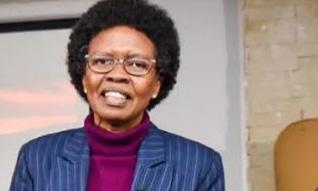
Former Gauteng premier Mbhaz ima Shilowa said: “The irony is that the President is supposed to sign this bill on the 10th of December, which is international Human Rights Day, and it would be a tragedy if he were to sign a bill that takes [away]

Defend Our Democracy says the bill is unfair because:
¡
At national level, independent candidates are required to get double the number of votes for a seat in Parliament that a political party requires.
¡
If an independent candidate were to vacate their position once elected, the bill does not allow for
that vacancy to be filled through a by-election. It allows for a recalculation that could result in a position being filled by a political party.
¡
Parliament did not sufficiently consult with the public about the bill, nor has it taken into account very reasonable arguments put forward by civil society about why the bill is unfair.
¡
The point of changing a voting system is so that voters can know who they elect to Parliament and then hold their MPs accountable.
In local government elections, candidates are known by voters in the wards where they stand.
With this bill, the whole country is considered one ward at a national level and a province is considered a ward at a provincial level.
“Ultimately, this bill would mean that political party representatives in Parliament and provincial legisla tures won’t be compelled to come to you in the next five years to explain why Parliament may not have held ministers accountable. Is this the kind of public representative that
“Wannabe authoritarian lead ers do not lead communities well when they are not afraid of the people, when they are not afraid of the consequences of doing a bad job,” American campaigner Nsé Ufot told a Rivo nia Circle meet-up in Johannes burg recently.
By Naledi Sikhakhane“
What does my voting right hold for me? What is its value?
If I was using it to trade, what am I getting back? How do I know it counts and how can I hold those I voted for accountable?” said Prince Qwabe, leader of Eku juleni Community Development in Soweto, at an event organised by non-profit think-tank Rivonia Circle.
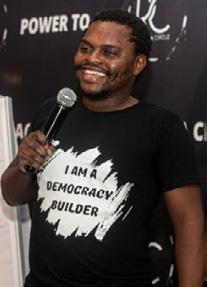
“You promised to deliver some thing. If I’m buying a fridge, there is a warranty and guarantee so I’m buying a promise. If I don’t get my promise, I should be able to take my vote back and say, ‘You did not deliver on your promise, keep it, I’ll keep my vote’. That is why millions don’t vote. There is no longer value in our vote.”
Several activists from around the country echoed Qwabe’s statements about voter apathy and general hopelessness at the state of South Africa at the event, which was held on Saturday, 8 October, in Johan nesburg.
South Africa 2.0 - Mobilising Peo ple’s Electoral Power was held in partnership with the New Georgia Project, an American voter rights advocacy and lobbying non-profit organisation, and included panel discussions and workshops in which attendees created a manifesto of possible campaigns and ways to motivate people to vote as well as improve the current electoral system.
Lukhona Mnguni, the head of research and advocacy at Rivonia Circle, said it was very telling that elections were already being dis
cussed and that it would take com mitment to bring about change.
“There was once a time in the last 15 years when some of us said the country is in crisis. The majority of the people said not yet, because some of us suffer from the doubting Tom syndrome… Luckily, 15 years later, there is no doubt we are in a crisis. For the first time since 1994, people are talking about an elec tion two years before it happens, which means they are willing to do something. The only thing that’s left is for them to commit to doing something about it,” he said.
Voter education and engagement
Keynote speaker Nsé Ufot, CEO of the New Georgia Project, pro vided the blueprint on how to cre ate engagement in apathetic voters. As a civic engagement and voting rights activist, she and her team have helped improve voter educa tion and registration in marginal ised communities in Atlanta, Geor gia, in the US.
Through the New Georgia Pro ject, young people, black, Hispanic, Asian and unmarried white women are continuing to get registered to vote, she said. Ufot’s creative and innovative efforts recently landed her on Glamour’s 2021 Women of the Year list and on Time Magazine’s TIME100 Next list.
The organisation believes in “going where people are”, targeting popular sports, arts and education gatherings. “We try to create value… If you find students moving into college residences, help them move in, then talk to them about the importance of voting and register them,” said Ufot.
“The idea of adding 1.2 million black people to the voting roll is terrifying… Having people who are informed and confident about who they are voting for is scary to those in power and so they rather steal and cheat elections. They would rather have people withdraw from political participation altogether,” Ufot said, referring to the 2016 elections in which Donald Trump became the US president and voter numbers were at an all-time low.
Ufot says online misinformation
campaigns targeting young people made them believe that their futures were already decided and they had no say in who the president would be.
“We are fundamentally unsafe and exposed when we don’t have robust participation in democracy. We are subject to the whims of unaccountable, wannabe authori tarian leaders who do not lead our communities well when they are not afraid of the people, when they are not afraid of the consequences of doing a bad job. We suffer, chil dren suffer, women suffer, the peo ple suffer,” said Ufot.
“One of the tools we have in our toolbox to build the country we want to see and prevent bad things from happening is the power of the vote. Yes, we have protesting. Yes, lobbying a government is impor tant, [as is] running for office - but we need to have robust participa tion in elections as a way to make
our country needs?” asked Defend Our Democracy.
The group has vowed to embark on a mass education campaign to familiarise ordinary members of society with the implications of the bill. It has also called on the public to engage with their local constituency offices and ask MPs to, “explain why they will be voting for or against the bill that benefits them more than it benefits us all”.
This article was first published by dailymaverick.co.za
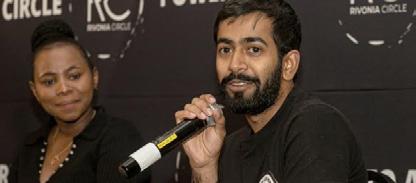

decisions as a society, decisions about the tax dollars, about our institutions, education, the climate and the world around us,” she said.
Ufot said New Georgia Project volunteers asked communities about their needs and what they cared about, and helped them see how voting gave them the power to decide about fundamental issues such as access to health, education and clean water. Having a say leads to safer communities and the inter twined nature of service delivery and a dignified life often encour age political participation and rep resentation.
‘South Africa may have to start again’
An audience member pointed to the lack of quality leadership alternatives in South Africa: “Every political party has its own corrup tion so even if we convince millions to vote, they still will be picking the same options.”
Ufot responded that there are possibilities outside the current closed-party system and South Afri cans might have to start over.
“Work with the system you have now to make a change until you can create the alternative that allows for voters to have the power and for politicians to act as they are meant to be employees of the masses, who can be fired if they do a bad job,” she said.
Mnguni said church leaders, art leaders and people from all walks of life are willing to learn and teach others about electoral processes.
“We are committed to holding legislatures accountable about the electoral reform process that is under way right now. We will be with the Defend Our Democracy launch in the public campaign to educate the voter on why the electoral reforms called for are so important and why Parliament is creating an injury to democracy by dragging its feet, by negotiating in bad faith, by propos ing an impossible and illegal bill to amend the current electoral act,” he said.
article was first published
our rights on international Human Rights Day.”
As a heavily armed convoy drove through a cheering crowd in Burkina Faso’s capital on Sunday 2 Octo ber morning, the boyish face of the country’s latest military ruler, Cap tain Ibrahim Traore, emerged from the turret of an armoured personnel carrier.
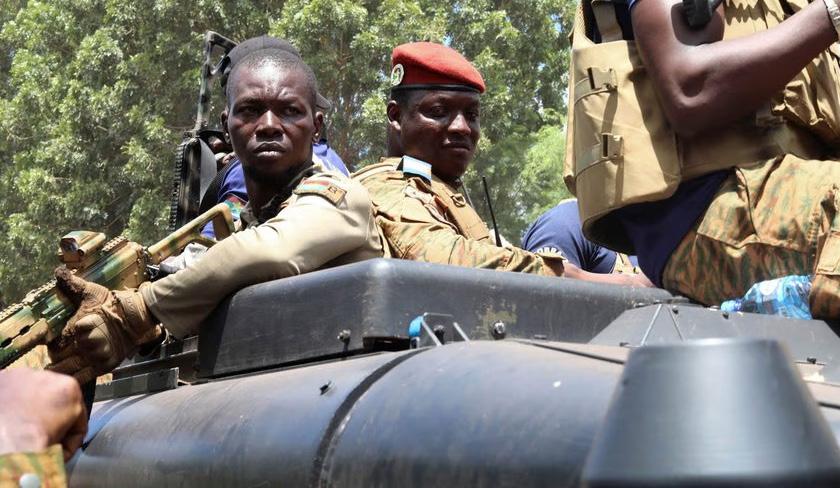
Sporting fatigues and a red beret, the 34-year-old smiled and raised his thumb as onlookers welcomed him, some by waving Russian flags.
Traore, a relatively low-ranking officer who days earlier was run ning an artillery regiment in a small northern town, has been catapulted onto the world stage since he and a group of soldiers overthrew Pres ident Paul-Henri Damiba in a Sep tember 30 coup.
Little is known about Traore and his colleagues, who since the coup have delivered statements on national television brandishing guns, ammunition belts, and masks.
They face gigantic challenges to alleviate hardship in one of the world’s poorest countries where drought, food shortages, and creak ing health and education systems provide daily challenges for mil lions. Yet the initial focus has been conflict and politics.
In an interview with Radio France International on Monday 3 October, Traore, a career soldier who has fought on the front lines against Islamist militants in the north, insisted he would not be in charge for long.
A national conference will appoint a new interim ruler by the end of the year. That leader, who could be civilian or military, will honour an agreement with West Africa’s regional bloc and oversee a return to civilian rule by 2024, he said.
“We did not come to continue, we did not come for a particular purpose,” he said. “All that matters when the level of security returns is the fight, its development.”
Still, an early picture has emerged of what Traore’s junta intends to do with its time in power.
Their moves, which may include army reform and ties to new interna tional partners such as Russia, could alter politics in West Africa and change how Burkina Faso fights an Islamist insurgency that has killed thousands and forced millions to flee.
Army officers initially supported Damiba when he took power in his own coup in January, prom ising to defeat the Islamists. But they quickly lost patience. Damiba refused to reform the army, Traore’s junta said. Attacks worsened. In the last week of September, at least 11 soldiers were killed in an attack in the north.
Meanwhile, Russia has expressed support for the coup just as regional neighbours and western powers condemned it.
“I salute and support Captain Ibrahim Traore,” read a statement from Russian businessman Yevg eny Prigozhin, founder of private
military company Wagner Group, which has operations across Africa, including in Burkina Faso’s neigh bour Mali.
Ties with Russia would put a fur ther strain on relations with former colonial power France, which has provided military support in recent years but has become the target of pro-Russian protests. Its embassy in Ouagadougou was attacked in the aftermath of the coup.
Wagner’s entry into Mali last year spelled the end to France’s dec ade-long mission to contain Isla mists linked to al Qaeda and Islamic State who have since spread into Burkina Faso.
Wagner and the Malian army have since been accused by rights groups and witnesses of widespread abuses, including the killing of hun dreds of civilians in the town of Moura in March.
Burkina Faso’s new leaders on Saturday 1 October stoked antiFrench rioting when they said in a statement on television that France had sheltered Damiba at a military base and that he was planning a counter-offensive.
The French foreign ministry denied the base had hosted Damiba.
Traore is on a crash course in diplomacy. He downplayed the link between Damiba and France and
called an end to the protests. About ties with Russia, he was vague.
“There are many partners. France is a partner. There is no particular target,” he told RFI.
Meanwhile, he must juggle every day problems. On Sunday 2 October, he arrived in military fatigues for a meeting with ministerial officials which was streamed online.
Can the junta guarantee the safety of schools that reopen this week, they asked their new leader. What is being done about a tender for a railway link to Ghana?
Traore, who had to consult with advisers, did not have all the answers.
ALesotho party led by a dia mond magnate won the most seats in last week's election, but fell short of an overall majority, the election com mission said on Monday, raising the prospect of more political gridlock.
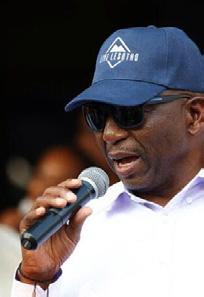
The populist Revolution for Pros perity (RFP) party emerged as the single biggest party with 56 seats, but now needs to court other groups to control the southern African mountain kingdom's 120-member parliament.
Should RFP, formed by wealthy businessman Sam Matekane in March, secure control of a majority in parliament through coalitions, it would pave the way for the first change in government there in more than five years.
Lesotho has been marred by years of political instability under the current governing party, the All Basotho Convention (ABC), which has run the country of 2.14 million people since 2017.

Divisions within the party have given it two prime ministers over that time.
RFP has promised to do away with rampant corruption and nepo tism and focus on economic growth by leveling the playing field for businesses.
"Matekane's victory is a clear pic ture that Basotho (the people of Lesotho) are tired of people who do not deliver when in power," political analyst Lefu Thaela said as the votes were being counted on Sunday night with the RFP taking a strong lead.
The election went ahead despite a deadlock in parliament on a whole gamut of major constitu tional reforms that were meant to be enacted ahead of the vote in order to bring order to the country's fractious politics.
In Lesotho's national assembly, 80 seats are won through "firstpast-the-post" voting and the rest
allocated using proportional rep resentation, under which parties get seats based on their total national votes.
'I am very disappointed'
Speaking to Reuters before polls opened, Lesotho political analyst Lefu Thaela said he thought the ruling ABC would lose the elections and that "the DC and RFP will be neck-and-neck".
Thaela said the DC was likely to get the most votes but if it didn't win an outright majority, the outgo
ing ABC could emerge as kingmaker.
Despite the vibrant range of par ties, some voters were decidedly unexcited by the options open to them at the ballot box.
"Truth be told, no government has ever fulfilled my aspirations and I am very disappointed," Semoko Monare, who has been voting since 1993, said.
Surrounded on all sides by South African mountains, Lesotho's high-altitude springs provide vital freshwater to its parched neigh bour, supplying the commercial
hub Johannesburg.
In 2020, ABC leader Thomas Tha bane stepped down as prime min ister after being charged with the murder of his ex-wife. He denied any wrongdoing, and the charges were later dropped.
His successor, Moeketsi Majoro, declared a state of emergency in August after lawmakers failed to pass constitutional reforms to amend everything from the role of political parties and rules on floor-crossing in parliament to the appointment of senior officials and
the prime minister's role.
The reforms were meant to make Lesotho less prone to political log jams but got stuck in one, them selves.
Lesotho has seen four coups since independence from Britain, and occasional bouts of unrest have forced South Africa to send in troops to restore order - most recently in 2014 and 1998.
However, analysts and partici pants expect these elections, even if close and highly contested, not to trigger street battles.
"These have been very peaceful elections and we are not expect ing any violence but for everyone to accept the results," deputy DC leader Motlalentoa Letsosa said.
Last month, Lesotho's highest court ruled that the state of emer gency was unconstitutional. The ABC has selected another leader, former health minister Nkaku Kabi, to contest its ticket. – reuters.com
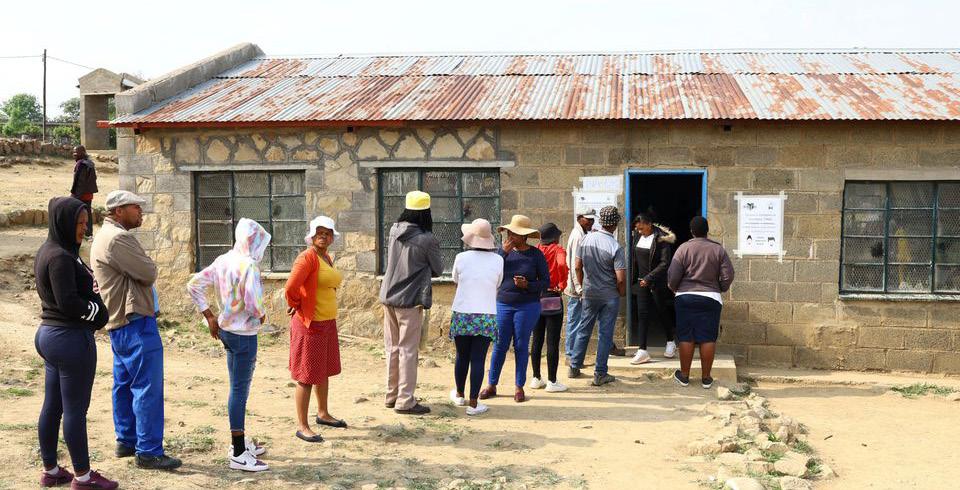
In the shack lands of Cato Manor in Durban, everything is a hus tle. If you want to find a room, you have to know someone. If you want to connect to illegal elec tricity, you have to pay someone.
Cato Manor is a crowded slum with little access to running water and flush toilets. Many residents relieve themselves in plastic bags which the municipality sometimes collects.

On the edge of Durban’s central business district, Cato Manor has been in the news for all the wrong reasons, including the murder of a councillor candidate and housing activists.
The area spans three municipal wards. Most people live in shacks.
The number of people is hard to estimate - over 90 000, according to the now defunct Cato Manor Devel opment Association. The shacks are crowded together and stretch for kilometres on either side of the M10. Some teeter dangerously close to the main road, others balance precariously on slopes. There have been numerous fatal fires and when it rains, Cato Manor becomes a messy bog.
Residents tolerate the overcrowd ing, shared and scarce toilets, crime, and pollution to save money by being close to jobs, hospitals, schools, and other amenities. And every month poor rural people flock to the shantytown to join them.
Most houses are illegally con nected to the grid in a tangle of dangerously low-hanging wires and there have been many fatal electro cutions, including of children.
Residents pay up in order to sur vive. An illegal electricity connec tion to the grid costs R300. There after, shack dwellers pay connected locals R120 a month for the stolen electricity.
The Cato Manor shacklands are among nearly 600 informal set tlements in eThekwini which the municipality says house upwards of 280 000 residents altogether,

although that is a contested figure.
Shackdwellers’ movement Abahl ali baseMjondolo is well-organised in the area, with strongholds in the Cato Manor neighbourhoods of Marikana, Azania, eNkanini and eKhenana.
Abahlali members are outspoken critics of the ruling ANC and have suffered for it. Since 2014, the movement says, eight of its mem bers have been killed, including three of its leaders who lived in eKhenana.
The latest victim was Lindokuhle Mnguni, who was shot dead inside his home on 17 August. Mnguni was one of three Abahlali members arrested for the murder of eKhenana resident Vusi Shandu earlier this year. The charges were dropped, but Mnguni spent six months in West ville prison, awaiting a bail hearing.
Abahlali has put eKhenana under CCTV surveillance, according to
Mqapheli Bonono, the movement’s deputy president. He says evi dence collected from the cameras, together with eyewitness accounts, will be presented in court at the next opportunity. “We electrified the place and we’ve even put up fencing and barbed wire. So, we know who the killers are. We are still building our legal case.”
An eThekwini councillor, who spoke to GroundUp anonymously for fear of retaliation, says politicians in the area have their eye on the land for a lucrative housing devel opment. This is why Cato Manor is valuable to politicians, he says.
“I don’t have bodyguards. When you tackle people on this topic, one must tread carefully. There is a very dangerous situation here with people in the ANC in eThekwini who stand to lose a lot if eKhenana and other informal settlements stay where they are,” said the coun cillor, who claims to have inside knowledge of the political motive
for three eKhenana-related murders.
Even within the ANC, a bloody battle for the area has taken place.
In May, ANC councillor Mzi Ngiba was one of four men arrested for the murder of his one-time friend and comrade Siyabonga Mkhize.
Ngiba lost an internal ANC con test to Mkhize who was nominated to replace him as the candidate for the November 2021 local govern ment elections. Mkhize won the seat, but by October, he was dead. Ngiba, who was next on the party’s list, secured his old seat and with it access to power and patronage he had become accustomed to since 2011 when he first served as a coun cillor.
Residents of Cato Manor were afraid to speak about Ngiba to GroundUp . Those who did speak are mostly Abahlali members hostile to him, who say he is a strongman tied in with local gangsters.
They say he has key influence over the allocation of government housing.
Abahlali members say ANC heav yweights are tied to taxi hitmen and there are numerous mafia-type rackets. Public land and low cost housing are sold illegally and there is no transparency in the process. Abahlali accuses the eThekwini municipality of refusing to secure wide public engagement for its plans for housing, meaning poor people in particular cannot improve their living conditions or partici pate in solutions. They say there is no oversight to let the public determine whether the municipal ity keeps accurate housing lists, who lives in shack settlements, and who receives subsidised housing.
For many Abahlali members, the creation of what they call a com mune, in eKhenana, offered an anti dote to poverty, deprivation and violence.
Here people live together sharing vegetable gardens, a poultry farm and even an educational centre. But since 2018, and with the murder of several - Abahlali says eighteKhenana leaders, the commune’s
population has dwindled from 100 families to fewer than 40.
At eNkanini, retaining walls were built out of old tyres; a community crèche was put up. A hall was also erected. And an Abahlali member tapped into the city’s water to create a flush toilet.
During Covid lockdown, resi dents Vusi Mazula and Nhlanhla Mtshali shrugged off the city’s hous ing failures telling GroundUp that while they wanted to engage with authorities, waiting for feedback was pointless. So they simply got on and built their homes and com munity facilities. Building materials for a 12m2 shack cost about R3 500 and the structure can be erected in a matter of days.
Mazula and Mtshali said the com munity spirit activated by Abahlali in eNkanini tapped into the energy and resourcefulness of people and empowered shack dwellers.
Mazula, who ran a small shop, said that in four years eNkanini had quadrupled in size because land was vacant, housing scarce and the area was close to town.
“It is crowded. This is my space, but you can’t have a selfish heart. I can’t let my brother sleep on the road. We are battling. We tried to manage it (the influx of people) tightly in the beginning, but it is impossible to stop people from coming.”
Mazula said during Covid the municipality installed eight mobile toilets in the area around his house. “The toilets are for about 800 peo ple. We are lucky. Across the road there are no toilets.”
Mtshali said the municipality installed five rain tanks in the Covid lockdown. “We asked for more. The government keeps on promising but most of what you see has been done by us.”
GroundUp reached out via email, phone and SMS to the ANC in eThekwini, Mayor Mxolisi Kaunda and the eThekwini municipality for comment regarding Abahlali’s alle gations, as well as plans for hous ing and service delivery, but no response was received. – groundup. org.za
If your answer is yes, worry
more!
days of expensive adoption
which can cost anything between R12000 to R20000 or more, are all gone. Government now offers a free service to qualifying Parents/Guardians who wish to adopt children. “The Gauteng Department of Social Development is leading
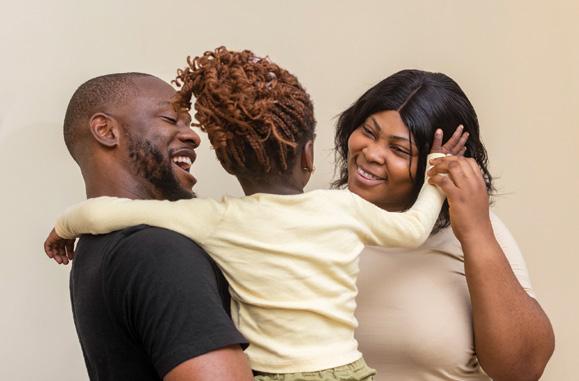
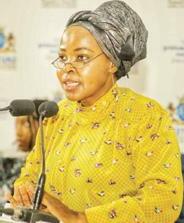
process in the province, and hereby wishes
inform
in
a
a child a home and you are over the age of 18 years and meet the criteria, you can adopt a child.
A child is adopted when the child is placed in the permanent care of a person in terms of a court order.
The Gauteng Department of Social Development is now rendering child adoption services to prospective parents at no cost.
a) To protect and nurture children by providing a safe, healthy environment with positive support: and
b) To promote the goals of permanency planning by connecting children to other safe and nurturing family relationships intended to last a lifetime.
Any child may be adopted if –
(a) The adoption is in the best interest of the child.
(b) The child is an orphan and has no guardian or caregiver who is willing to adopt the child.
(c) The whereabouts of the child’s parent or guardian cannot be established.
(d) The child has been abandoned.
(e) The child is in need of a permanent alternative placement.
(f) The child is the stepchild of the person intending to adopt.
The child’s parent or guardian has consented to the adoption
A child may be adopted –
jointly by –
a husband and wife
partners in a permanent domestic life-partnership or
other persons sharing a common household and forming a permanent family unit.
a widow, widower, divorced or unmarried person.
married person whose spouse is the parent of the child or by a person whose permanent life-partner
parent
biological father of a child born out
foster parent of
of its
service that Social Workers in the
of the Department of Social Development did not possess. The Child Protection Organisations and Social Workers in Private Practice were championing this service in the province.
The South African Council for Social Service Professional (SACSSP) in conjunction with National Department of Social Development and the Services for Children Directorate has ensured that the Social Workers in the Province are well capacitated and registered with the SACSSP to render the adoption services.
Adoption is a statutory process facilitated through the Children’s Court and there are strict legal procedures that promote the goals of permanency planning that connects children to nurturing family relationships intended to last a lifetime; it requires continuous monitoring, support, and it must be rendered by registered and accredited Social Service Practitioners as it is now a field of specialty.
Experts reckon mental health needs of children are neglected.
Photo by www.open.edu
Almost two-thirds of South Africa’s children are facing their mental health prob lems alone; avoiding help or treatment when they need it most. And experts believe the only way to address this worrying trend is for parents to become more vig ilant of their children’s behaviour.
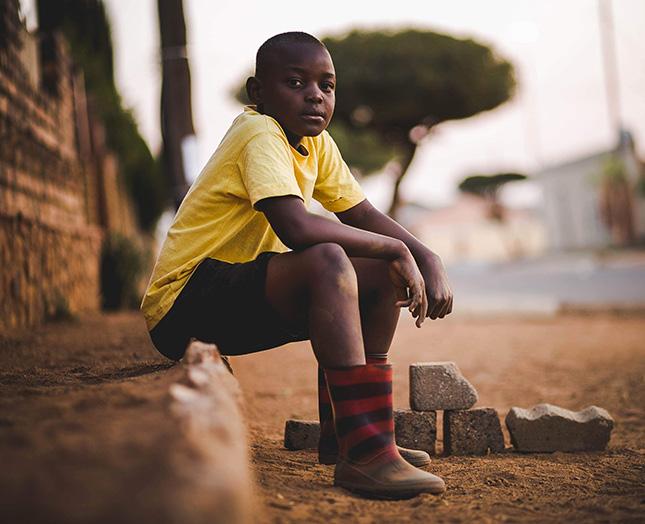
Bongani Ndlovu, a 15-year-old from Soweto, knows what it’s like to feel all alone.
“What breaks me is the fact that no one in my family noticed that I wasn’t okay. This means that I’m alone and have no one to turn to during this time,” said the teen. He said he never healed after he was mugged and his cellphone taken away for months.
Michel’le Donnelly, Project Leader for Advocacy & Awareness at the South African Federation for Mental Health (SAFMH), said that 10% of children and adolescents worldwide experience a mental dis order, but most don’t seek help or the care that they require.
“In South Africa, 65% of young people reported having some form of a mental health problem but did not seek any help. Experts warn that not addressing mental health for children and adolescents can extend into adulthood and limit opportunities for leading fulfilling lives. Children and adolescents in our country are facing an uncertain future, so we must find ways to pro
mote children’s mental health and resilience and ensure that they have the requisite skills to cope with life’s challenges,” said Donnelly.
“According to the South Afri can Child Gauge 2022, children and adolescents “feel afraid, angry and anxious because their routines, education, recreation, and family finances have been disrupted”. COVID-19 also threatened the sta bility of homes. It reduced the men tal health and capacity of parents and other supporters to maintain a stable, emotionally regulated, and secure environment. This envi ronmental disruption significantly impacted the mental health of children. We, as SAFMH, believe that the same strategies we use to tackle external threats like climate change can also be applied to tackle the aftermath of COVID-19,” she added.
The Better Health Channel said teenagers who experience a dis tressing or frightening event are often concerned by these strong emotions. “Even though these reac tions usually subside as a part of the body’s natural healing and recovery process, it is important for parents or carers to understand how a teen ager manages distress and trauma so they can support and help the young person.”
Teens spill their hearts out Ndlovu says he was triggered by a discussion during a Life Orientation lesson in school when the teacher asked them to share traumatic expe riences they went through. “It was there and then that I realised that I am suffering from mental health
problems because I had flashbacks of the day I was mugged. I was shaking, and up until this day, a simple walk down the street freaks me out.”
Siphelele Magudulela, 19, also based in Soweto, said even though he received help after being kid napped, he still struggles with focusing on school, using public transport, and feels insecure.
Magudulela, whose kidnappers demanded a ransom from his family in February 2021, said his family and community were all very sup portive.
“A detective who was dealing with my case referred me to a clinic that is based in a court, where I received counselling sessions. I only attended a few, and my older sis ter always accompanied me,” said Magudulela.
How kids respond to trauma
The Diagnostic and Statistical Man ual of Mental Disorders 5 defines trauma as ‘exposure to actual or threat ened death, serious injury, or sexual violation. When a child experiences a deeply distressing, life-threatening or stressful event such as violence or injury (traumatic event), acute and chronic stress responses such as fear, anxiety, panic, and shock commonly ensue’.
Children’s responses to traumatic events vary, with their responses influenced by different factors like trauma history and cultural back grounds. According to the American Psychological Association (APA), many of the reactions displayed by children and adolescents exposed to traumatic events are similar or
identical to behaviours that mental health professionals see daily in their practice.
These include:
development of new fears
anxiety (particularly in young children)
disturbance, nightmares
of interest in normal activities
concentration
decline in schoolwork
complaints
The APA also reported that chil dren and adolescents exposed to violence regularly often experience many of the same symptoms and lasting effects as children who are victims of violence themselves, including post-traumatic stress dis order (PTSD).
Donnelly told Health-e News that half of all mental conditions start at 14. However, most of these cases remain undetected or untreated. “If we teach children to speak about their mental health and provide safe conditions for them, this pro portion might not be so high,” she said.
regards to suicide, research shows that before trying to take their own life, a teen may have thoughts of wanting to die. This is called suicidal ideation. Threats of suicide are a cry for help, and if a teenager is having suicidal thoughts, they must know that they are not alone and that they should reach out to someone they trust and seek the necessary support.
Children should be taught mes sages such as: “Remember, there is nothing shameful about talking about feeling like you are not cop ing, needing help, or talking about suicide,” said Donnelly.
Magudulela said apart from expe riencing anxiety now and then, a car stopping anywhere near him makes him uncomfortable.
“I still need to deal with the emo tional side, and I am even reluctant to help strangers after my traumatic experience. I am noticing things that are abnormal about me emo tionally. A car stopping, makes me panic, and on some days, I fear using public transport,” the teen ager said.
Donnelly added that not all teen agers with depression attempt sui cide, but most of those who attempt suicide, are depressed. Depression affects your thoughts, moods and body and is treatable. Of those seek ing help, at least 80% get better.
Warning signs of depression:
According to the South African Depression and Anxiety Group (SADAG), the following signs may be indicators of depression in teen agers:
¡
Loss of interest in fun activities.
¡ Sadness that won’t go away. Crying a lot.
¡
Irritability and/or anger.
¡ Having low energy, constant tiredness or being restless.
¡ Feelings of guilt or hopelessness.
¡ Worrying, anxiety and tension.
¡ Changes in appetite. Eating too little or too much.
¡
Changes in sleep patterns. Sleeping too little or too much.
Missing school.
School marks or performance dropping.
Having trouble making decisions.
Thoughts of suicide. Thinking a lot of dying or killing themselves.
Not socially connected to their peers, loneliness and feeling out of place.
SADAG also explains that the following may be warning signs of suicide in teenagers :
Depression.
Talking or joking about suicide.
Self-criticism, e.g. “I can’t do anything right.”, “I’m hideous.” etc.
Preparing for death by giving away things and/or saying goodbye.
Drastic personality changes.
Not taking an interest in appearance or a drop in personal hygiene.
Risk-taking behaviours include using drugs, drinking, driving, unprotected sex, etc.
Writing poems, essays, or painting/drawing images of death.
Suddenly feeling better. This could mean that they may have decided to die by suicide, set a date for their suicide, and they know that their pain will soon end.
Getting children to open up Schools are crucial starting points in being equipped to deal with mental health in classrooms.
“The 2021/22 South Afri can Child Gauge describes the current and potential roles of schools in promoting and pro tecting mental health in the South African context. One way is for schools to normalise good mental health as some thing we should all strive to achieve. Having children talk openly and understand the topic is vital. By simply starting the conversation about men tal health with children, you can share as much informa tion and create understanding before stigma can even start to settle in,” said Donnelly.
Ndlovu said he hadn’t received any help after what he went through.
“I didn’t get any help because my parents couldn’t see that there was something wrong with me. They weren’t at all supportive throughout my journey. This has affected me a lot at school because this was always in my thoughts,” he said.
“Whether in the classroom or on the playground, all chil dren must understand that they should respect and care
for one another. Bullying is prevalent on the playground, so equipping children to understand that it is wrong and that they should not be scared to speak up against bullying – whether for them selves or others – is one way we can encourage children to be mindful of mental health in all environments,” Donnelly explained.

“With that said, all teach ers and parents should feel empowered to answer ques tions that children may ask to not further stigmatise the topic of mental health. These questions can sometimes be very straightforward, such as: ‘Why is that person cry ing?’ Experts advise answering such questions directly and honestly. It’s also important to reassure your child about any concerns they may have about their safety or their loved one’s safety,” she added.
There is always help on hand Help is available. For those who are suicidal and need help or are unsure how to help someone in need, contact:
¡
The National Suicide Crisis Line on 0800 567 567. This number is free, operates 24 hours, and offers counselling in all 11 official languages.
Additional FREE hotlines for support with your mental health include:
Dr Reddy’s Mental Health Helpline on 0800 21 22 23
This number is free and oper ates 8AM – 8PM every day.

Cipla Mental Health Hot line on 0800 456 789 . This number is free and operates 24 hours.
The Adcock Ingram Depres sion and Anxiety Helpline on 0800 70 80 90 . This number is free, operates 24 hours, and offers counselling in all 11 official languages.
The Substance Abuse Help line on 0800 12 13 14 . This number is free, operates 24 hours, and offers counselling in all 11 official languages.
Donnelly said we need to focus on creating supportive and encouraging environ ments that allow our children to thrive.
“Children and adolescents in our country face an uncer tain future, so we must find ways to promote children’s mental health and ensure they are equipped to cope with life’s challenges. We, as SAFMH, call for these solutions to not only include medical treatment but an overhaul of our health care system that addresses all social and environmental drivers of ill health.” – Health-e News


Every year in October nearly 100 countries organise activities to mark World Space Week. The theme this year was space and sustainability. In this interview, Adejuwon Soyinka, West Africa regional editor at The Conver sation Africa, asks Etim Offiong about how far Africa has come in the space age and what bene fits the continent stands to gain from its investment in space technology.
Russia’s Sputnik kicked off the space age in 1957. But Africa didn’t join until 1999. Why?
Sputnik happened partly due to the cold war rivalry between the US and the former Soviet Union. During this period, most African countries were still under colonial rule. Only Ghana had gained independence earlier that year.
Through the colonial systems and structures put in place then, African countries had no control over their natural and human resources. The colonies were made to focus on the labour, raw materials and agri cultural crops that were needed by their colonial masters.
They could not pay attention to research and development, par ticularly in nuclear physics, space and the oceans. Educational sys tems were also designed to meet the needs of colonial masters. Outer space was, therefore, of little con cern to Africa.
Free nations on the other hand could channel their resources into space exploration.
Despite the restrictions and chal lenges in their home countries, Afri can scientists still made efforts to study and do research in their areas of interest. These were mostly done abroad through scholarships and fellowships. Some of these scientists were interested in understanding phenomena surrounding the Earth and Sun.
At about this time (1957-8), the International Geophysical Year pro vided an opportunity for interna
tional research on the science and impact of the Sun-Earth system. The US also placed tracking stations in Nigeria and South Africa to support US space missions.
In that sense, one may say that Africa participated in early space activities. But the activities were not designed to benefit African coun tries.
How far would you say Africa has come in the space age?
As African countries started gain ing independence, they could, to some extent, control their human and financial resources. The speech made by Ghana’s Kwame Nkrumah at the launch of the Organisation of African Unity in 1963 highlighted how Africa’s development and pros perity needed science and technol ogy.
But a major leap in space activ ities started around 1998, with the establishment by the United Nations of Regional Centres for Space Science and Technology Edu cation in developing countries.
Two centres were established in Africa: one in Morocco for the French-speaking African countries
and the other in Nigeria for the English-speaking African countries.
At about this time, South Africa was developing what would become Africa’s first indigenously built sat ellite – Sunsat – which was launched in 1999.

From these early steps, more Afri can nations started developing an interest in space. Those that were already aware of the benefits of space technology in development started seeking means to procure satellites and acquire space-related knowledge.
In addition to national initiatives, there are several externally funded space-related programmes and pro jects in Africa which have created an inflow of funds, knowledge and infrastructure into the continent. Furthermore, the African Space Pol icy and Strategy was adopted in 2016. Some African countries have also developed national space pol icies and strategies.
So, Africa has made some gains, but it could be better.
How has Africa benefited from investment in space technol ogy?
There is potential to apply space technology in various areas, includ ing agriculture, transport, urban planning, environmental manage ment, disaster management and natural resource management.
The UN-affiliated regional cen tres in Morocco and Nigeria have trained several hundred Africans in these areas.
In addition, some African coun tries have procured small satellites, mostly through the help of aca demic or commercial institutions abroad. Unfortunately, there has been little or no technology trans fer.
Similarly, the technology and knowledge from externally funded programmes have yet to be properly internalised, codified and diffused.
Some African countries have commenced academic programmes in areas such as astronomy, remote sensing, space weather, satellite communication, satellite geodesy, satellite meteorology and space law.
The challenge is that there are few jobs for the graduates.
Africa eventually loses them to countries where their knowledge and skills are better used. Africa,
therefore, needs to be strategic in its engagements and programmes. What do African countries need to do to get better at this?
In my view, it begins with a national space policy and strategy. A national policy states where a country wants to go, the national space strategy states how it will get there. The policy states the vision, overarch ing goals and guiding principles; the strategy translates these into actions and programmes.
Space policies and strategies are important because they enable pre dictable positive outcomes for a country, region, or organisation. They lead, guide and guard all stake holders – government, industry, academia and civil society – towards attaining corporate interests, goals and priorities.
Due to the unique nature of the space domain (scientific, commer cial, military and geostrategic inter ests), developing a space policy and strategy is not as simple as other public policies.
On the flip side, space policy and strategy operate within an international legal regime. There are treaties, principles, norms and guidelines for space activities.
This is where the African Space Leadership Institute comes in – to develop Africa’s capabilities in space policy, strategy, law and govern ance. The institute was also estab lished to provide advice and insight on issues in the African national and continental space landscape.
All these would be within the frameworks of the African Union’s Agenda 2063 and the UN SDGs.
African countries need to be more deliberate in developing space capabilities. A party can only ben efit from bilateral or international cooperation if it brings something to the table, knows what it wants to get from the cooperation and negotiates well.
So, quite a lot of strategic fore sight is needed in Africa.
This article was first published in The Conversation

ecay, despair, disease, and corruption: these are the recurrent images of Africa bandied around the world.
As cultural critics and scholars, we are inclined to lament the stere otypical and reductionist version of African realities that passes for truth. And yet, despite being keen observers of the African world, we too are often implicated in a preoc cupation with what ails the conti nent on any given day.
We are usually more attuned to Africa’s pains than to its pleasures.
This is not so much because we subscribe to the reductionist view of Africa, but because it seems almost irresponsible to devote our ener gies to a subject as mundane as pleasure when we could be busy responding to whatever deficiencies have been most recently observed somewhere in Africa, or somewhere about Africa.
Those of us who make it our busi ness to offer a defence of African peoples and their ways of life con sider as always suspect the pointless indulgences entertained by promi nent African figures.
With good reason, the pleasures enjoyed by rulers of diverse ideolog ical temperaments are viewed with barely concealed disdain.
Think of Mobutu Sese Seko’s pala tial home at Gbadolite, HouphouëtBoigny’s massive cathedral at Yamoussoukro, or Jacob Zuma’s con stantly expanding country home at
Nkandla. In the pleasure-unpleasure nexus, then, our attention tends to be firmly fixed on unpleasure and displeasure, notably the unpleasant ness of the populace at large.
And when we do reflect on pleas ure in Africa, we do so with apologies for setting aside our usual engage ment with the very serious matters that as well-informed researchers of the African continent we see as our true vocation and calling.
Pleasure tends to enter into the record of African studies , then,
mainly when it serves an acceptable social or political agenda. But we cannot claim to have a complete understanding of any society, no matter its failures if we ignore its experiences and rationales of pleas ure. In the African Studies Review forum titled Africa/Pleasure: An Agenda for Future Work, we explore pleasure simply as one of many facets of African life, and not as a spectacular exception to the norm of African humanity.
As we state in the introduction to the forum, even in very dire circumstances, one cannot rule out an occasional incidence of pleasure.
Those pleasures may be fleeting and accessible only to the few.
But they should not be dismissed, nor should we underestimate the role that pleasures of any variety play in enabling those who are oth erwise distressed to reclaim some sense of their humanity.
To be sure, there are several sub jects adjacent to the question of pleasure that already attract our attention in African studies research, including discussions about African popular culture and experiences of leisure.
But a study of the object that trig gers pleasure is not quite the same thing as a study of the pleasure that is triggered. Indeed, no source of pleasure is persistently pleasurable.
For the unemployed, for example, an abundance of free time is not inherently pleasurable. We rarely
inquire what pleasure means or has meant to Africans, what instigates or does not instigate pleasure, the circumstances under which pleasure can be had, and what is at stake in the practices of either policing pleasure and or commodifying pleasure.
Even as we acknowledge the important work undertaken by scholars, such as Rachel Spronk, who have researched pleasure in specific settings, the introduction to this forum revisits the lengthy history of a deeply entrenched aver sion for pleasure research among scholars in African studies.
We then lay out an agenda for expanding research on pleasure in Africa, followed by five articles each offering a case study but also an approach to studying Africa/pleas ure that can be extended to other contexts. For an understanding of Yorùbá attitudes towards pleasure, Akinwumi Ogundiran’s essay on what he calls a Yorùbá ontology of pleasure relies both on an analysis of mythology as well as the results of archaeological excavation around territory long inhabited by Yorùbá populations.
Naminata Diabate’s contribution to the forum explores a sexual econ omy in Abidjan that thrives on promising the delivery of future pleasures. Through an examination of textual genres from three differ ent periods in time, Karin Barber’s article in the forum considers the
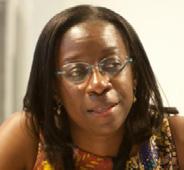
role of textual pleasure in the con stitution of sociality among the Yorùbá.
In her paper, Asante Mtenje explains how pleasures arising from gendered play among urban Malawian women can be both an opportunity to undermine and to reaffirm local forms of patriarchy. Moradewun Adejunmobi uses her essay in the forum to show how certain types of Nigerian popular media allow some viewers to find pleasure even in the absence of leisure time.
By calling for a more focused understanding of pleasure in the African world, we are not simply asking for everyone to recognise that Africans too can experience pleasure. After all, an aptitude for pleasure is not limited to any one place or nation.
Rather, we are inviting those of us who research Africa to put aside our general avoidance of the sub ject.
We are also asking for an approach to the study of pleasure that does not start and end with censorious judgment. – africasacountry.com
All six essays described here are part of an Africa/Pleasure project initiated by the late Teju Olaniyan, literary scholar based at the University of Wisconsin-Madison. He passed away in November 2019 and the forum on pleasure in African Studies Review is dedicated to his memory.
With each passing day, it is becom ing eerily clear that we are gov erned by people who suffer from social deafness. The insensitivity they display defies logic.
Their tin-eared attitude has made it impossible for them to show any sign of empathy for citizens who are weighed down by a myriad of prob lems.
In their greed and infinite wisdom, the powers that be scrapped the minute limit of R5 000 completely freeing ministers and their deputies from paying for municipal services at their official resi dences.
This came after politicians and government bureaucrats received salary increases of 3% backdated to April 2021.
The confirmation that the blue light brigade gets free electricity and water shows that the system was not designed for ordinary South Africans.
None of these important people earns less than R2 Million per annum, yet they consume water and electricity free of charge.
This exemption gives emphasis to the fact that the governing party is contemptu ous of citizens who can barely make ends meet.
Not only do politicians live in a bubble but they are also evil. Only evil people have the gumption to show disdain for the absolute agony to survive experienced by millions of South Africans. As we struggle to pay for water and electric ity because money is hard to come by, Cabinet ministers are enjoying a free ride.
They do not care what ordi nary South Africans who fund ministers’ luxury lifestyles are going through as the cost of living is heading far beyond the stratosphere.
These very ministers and the lame duck president, speak until they form at mount demanding that as citizens we must pay for what we con sume, yet they do not spend a cent for what they consume.
The president and his dep uty are on record, telling us to pay for services.
Ramaphosa told us: “We must pay for services and pre vent illegal connections.”
Sometime back in 2019, David Mabuza said: “It’s a good culture that we must teach ourselves: pay for services that you have consumed.”
Is it a case of do as I say, not what I do?
Why must cabinet appa ratchiks continue to swim in a pool of sweet perks while the nation drowns in murky socio-economic dams?
George Orwell captured it beautifully in Animal Farm: “Comrades!' he cried.’
You do not imagine, I hope, that we pigs are doing this in a spirit of selfishness and privilege?
Many of us actually dislike milk and apples.
I dislike them myself. Our sole object in taking these
things is to preserve our health. Milk and apples (this has been proved by Science, comrades) contain substances absolutely necessary to the well-being of a pig. We pigs are brain workers.
The whole management and organisation of this farm depend on us. Day and night we are watching over your welfare.
It is for your sake that we drink the milk and eat those apples.”
Beware of the wages of greed and arrogance
If only one of the big animals had the time and inclination to listen, they would take heed of what political analyst Dr Dale McKinley told SABC News.
He articulated it well when he pointed out that the deci sion by Ramaphosa’s admin istration to give Cabinet ministers and their deputies free electricity and water “is a recipe for social unrest”.

McKinley told the SABC: “Do they have any sense of what people are going through, any kind of empa thy, any kind of sense of that, or are they just living in a bubble at such a level, that they can’t see what everyone else is doing? And they don’t think there’s anything wrong with it. That is, I think, what is really, really making people angry.
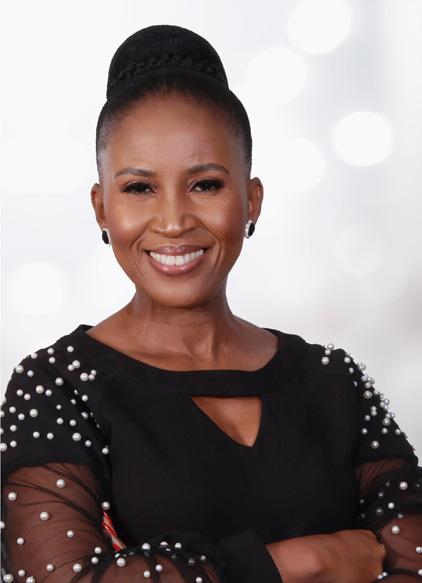
When we ask them, like wait a minute, don’t you feel bad about this, they say no, we don’t, it’s ok for us. And I think that abusing taxpay ers’ money for self-interest, is really, really outrageous.”
Hard-hitting commentator Makhosini Mgitywa captured the mood on his Facebook page thusly: “I never thought I’d live to see the day our gov ernment becomes so detached from the realities of ordinary South Africans and that it would be this extreme.
“The overwhelming major ity of South Africans have to do with far less than R2m and yet we pay for everything we consume. Why should ministers not pay for water and electricity when they are already at the top end of the income scale?
“Most of the economic problems facing this country were, at best, allowed by the government to materialise or, at worst, were caused by this government through either of the two ANC factions that have occupied power.
“Ministers insulate them selves from the financial consequences of their own executive decisions (such as some of the crazy lockdown regulations) and the rest of us not only have to comply and lose our income in some instances, we also have to pay for their water and electricity which, by the way, never gets interrupted.”
When the country's despondent citizens resort to extreme violence as a result of the crude insults from the government, nobody must cry foul.
Dr Mpho Phalatse’s unfolding public circus has nothing to do with a well-orchestrated takeover by the governing ANC. She is suffering a fate designed by the DA’s baasskap to humiliate her.
With a trivial procedural irregular ity, Dr Phalatse is hopping from court to court claiming she was “unlaw fully removed” from office. She tells all and sundry how “patently unlaw ful” the decision to hold the council meeting that kicked her out was.
This miniature technicality was tested ahead of the council sitting of 30 September that elected Dada Moreroa as the new mayor. She had approached the Johannesburg high court to stop the council meeting but the court struck the matter off the roll.
In an interview with Clement Manyathela in 702, Dr Phalatse said she was about to let Joburg be controlled by “the coalition of the corrupt”, which she reckons is com manded by a cabal whose purpose is to pilfer.
She also told Manyathela that the DA was in talks with other political parties to regroup with the aim of fighting the return of the ANC.
“I will not give up the fight. This has got nothing to do with power. It was never about power. We're still waiting for the courts to reinstate us into our rightful position of the legitimate government of this city,” Dr Phalatse told 702.
Well despite her fiery public stance green flies seem to be gather ing around her political career. This might just be the beginning of an end to her political ambitions; but just to make sure, the DA white supremacy wants it to be a devastating end.
They watched as she relished power. They saw how she was cap
tivated by its magnetism. Like an unsuspecting spider web victim, she was entangled beyond any form of autonomy.
This allure of power came with a great vulnerability. She depended on her party for survival and those who ran the party embraced her destiny with great anticipation.
They knew that her past as an open-minded novice, with slapdash behaviour where she openly chas tised her political superiors, will come back to haunt her.
They couldn’t wait to serve her their revenge, but they wanted to serve it very cold. When she got kicked out of the council, the party machinery set in motion the second tremors. These are meant as a pain ful, public humiliation that must be drawn out for as long as it can go.
What exactly are Phalatse’s sins?
Around this time last year, then as a DA mayoral candidate in Johan nesburg, she said her party scored an own goal by putting up controver sial campaign posters in Phoenix, in Durban and that it must take them down.
The campaign posters read: "The ANC called you racists, the DA calls you heroes" about events that took place in Phoenix during last year's July unrest when 36 people were killed.
DA leaders, due to mounting pub lic pressure, very reluctantly with drew the offending posters.
Next, within days as the mayor, she goes about saying very unDA things. She described Alexandra as an important community in the city that has long been “neglected and exploited by politicians for their own gain.”
This probably did not sit well with well-heeled business people in Sand ton… and the real party bosses.
“I want this township to become a place where women feel safe walk ing the streets at any time of the day; where the sick can access qual ity healthcare; where quality basic services are delivered by the City; and most importantly, the residents are economically active and empow ered,” she said.
The DA wouldn’t care any less what happens to the people of Alex.
Then there was the famous public spat with the DA ancestral royalty Tony Leon. With all avenues avail able to him, Leon chose to address the mayor through Twitter.
“Fix potholes and traffic lights and pavements that far more than strategic planning sessions will win the allegiance of your voters,” he tweeted.
Being the political rookie she is, Dr Phalatse missed the writing on the wall, she hit back: “You're too old for this Twitter trolling behaviour of yours. If you want to contrib ute constructively to the rebuilding of the city please send an email to MikeMo@joburg.org.za.”
Dr Phalatse’s removal as mayor through a vote of no confidence might be just what the baas desired.
It’s funny how she misread this obvious trap. She worked with Her man Mashaba and he too fell for the same ploy from Tony Leon and suffered the same fate.
In April last year, shortly after he left the DA, in an OpEd penned for the Daily Maverick, Mashaba wrote:
“The racism I experienced in the DA was not overt. Rather, it was that less honest, covert, paternalistic, dif ficult-to-put-your-finger-on-it kind of racism.
“It was the kind of racism that questioned why we were spending time delivering services to informal settlements when they don’t repre sent traditional DA voters and those who pay the rates.
“It was a kind of racism that, left to its own devices, wanted me to prioritise grass cutting in the suburbs over providing people with the dig nity of a toilet.
“It was the kind of racism that would resist policies to address spatial inequality in Johannesburg, because “if living in the suburbs was easy, it would not be something to aspire to.”
It is for this reason that he was “not DA material”, according to Tony Leon of course.
We will await Dr Phalatse’s exit tag. We know that Mmusi Maimane was a “failed experiment”, Lindiwe Mazi buko was “a diva” and Mbali Ntuli was an “egotistical prima donna”.
So, when you watch Dr Phalatse make a fool of herself on the news, cheered on by the DA, just remem ber, this is how she is made to pay back for speaking as she pleases to the baas
Iwas caressing a glass of peat ed-whisky which had the pres ence of the holy trinity of the whisky divinities when some nincompoop introduced a topic about political leaders who will lead us into a bright future.
This triggered me; to mention a bright future and political leaders in one sentence is cruel when I am drinking whisky. This fellow did not know that whisky to me is like a gor geous woman worthy of unlimited admiration.
I also tend to be triggered by our inept, arrogant, frozen-brain and dim-witted leaders.
Their ineptitude has pushed the growth of Africa down a dangerous and slippery slope which makes it unlikely for us to look forward to a bright future.
How I wish leaders were chosen on the basis of their skills and potential. We would not find ourselves trapped with these cunning, self-promoting, pilfering, and narcissistic delusional stooges.
The pulsating throb of Africa’s lack of progress has found residence in the African Union (AU). At times I can’t help but deduce that at the helm of the AU sits a greedy collec tion of individuals who are adept at pulling each other down like crabs in a barrel. Their ruckus has nothing to do with the Union and more impor tantly, with citizens of this continent called Africa.
Africa is still beset with numer ous socio-economic problems. This has reduced, in importance, our continent to a dreaded add-on to the global community. We are only harked back to for the curse of wars, poverty, human trafficking, scrawny and dejected refugees.
The shortage of statesmen imbued with strategic vision to give our con tinent a deserved break with our
dreadful past, is one of the major shackles to development.
Our brain-deficient leaders are firmly entrenched in the business of feeding their egos and collect ing crumbs from pseudo-benevolent funders, hence the failure of the AU to take Africa on a growth trajectory.
They are not sufficiently blessed with the will and ability to provide visionary and pragmatic leadership.
It escapes these blockheads that if the AU continues to lurch from one blunder to another and fail to deliver, Africa will not progress, and we face the prospect of yet more decades of suffering.
Their lack of inaction and/or inde cisiveness is borne by the citizens.
This can easily be determined by shortened lives and frustrated ambi tions of the people of our continent.

A cursory glance at the news will show you that there are thousands of young African persons who have been gobbled up by the sea and oth ers have died in the cruel desert; all in pursuit of a better life elsewhere.
These young people are prepared to risk everything, including their lives, because they know there is no hope for them in their own conti nent. Our leaders seem to be blind to the fact that they need to act urgently.
The AU must stop acting like that miserably useless and dead organ isation that it took over from; the Organisation of African Unity (OAU), whose recollection we have of it are the extravagant annual shindigs at which dictators patted themselves on the backs for their prolonged stay in office.
The AU is yet to prove to us that it is truly committed and has the wherewithal to implement for posi tive results and impact for Africa to turn the corner.
We have been witnesses to the
failure of the AU in implementing the thousands of resolutions they have adopted over the years.
It is infuriating to also learn that they have no way to determine how many of these resolutions have in fact been implemented.
This failure tells us a heart-break ing tale; they don’t really care about us and implementation of the deci sions they make is of no importance.
In a 2017 document by Paul Kag ame, called the Report on the Pro posed Recommendations for the Insti tutional Reform of the African Union, there is an admission which reads,
“Nevertheless, the unfortunate truth is that Africa today is ill-pre pared to adequately respond to current events, because the African Union still has to be made fit for purpose.”
The report revealed a number of key findings, which shaped the pro posed recommendations.
¡
The chronic failure to see through African Union decisions has resulted in a crisis of implementation
¡
A perception of limited relevance to African citizens
¡
A fragmented organisation with a multitude of focus areas
¡
Overdependence on partner funding
¡
Underperformance of some organs and institutions due to unclear mandates or chronic underfunding
¡
Limited managerial capacity
¡
Lack of accountability for performance, at all levels
Unclear division of labour between the African Union Commission, the regional economic communities (RECs), other regional mechanisms (RMs), and member states
Inefficient working methods in both the Commission and the Assembly
As things stand the AU is a dys functional organisation which as
citizens of this continent, we see limited value, little credibility, and more seriously, we have lost what ever little trust we had.
The AU must cease with this dith ering, because Africans are dying from wars and poverty.
We have seen the resurgence of devastating wars where hundreds of people are being slaughtered and many more displaced.
Leaders of the Union must pull the plug on the rhetoric about Afri can unity and urgently move, if they can, to a more practical approach to achieve real advancement for the well-being and security of Africans.
In discussions at Addis Ababa, Ethiopia, in early 2016 during the launch of Economic Report on Africa 2016: Greening Africa’s Industriali zation , most experts concurred that amongst the many reasons for Afri ca’s slow industrialisation, one of them “is that its leaders have failed to pursue bold economic policies out of fear of antagonising donors.”
Writing in The Financial Times, in the same year, Kingsley Mogh alu, a former deputy governor of the Central Bank of Nigeria, said, “Africa stands on the cusp of a lost opportunity because its leaders— and those who assess its progress in London, Paris and Washington—are wrongly fixated on the rise and fall of GDP and foreign investment flows, mostly into resource extrac tion industries and modern shop ping malls.
African countries must reject the misleading notion that they can join the West by becoming post-in dustrial societies without having first been industrial ones.”

Kingsley got a nod from Ha-Joon Chang, an economist, who told the Addis Ababa gathering that “African
countries need to have the self-con fidence to develop alternative poli cies and stick to them.”
Are there any leaders whose loins are made of steel? I am not talk ing about some dimwits who suffer from intellectual impotence.
I am talking about leaders who have the fortitude to implement all the impressive schemes and plans that get announced at a number of summits, promising to lift-off Africa into prosperity.
As a conclusion in the Report on the Proposed Recommendations for the Institutional Reform of the African Union , Kagame wrote, “Today, the AU stands at yet another cross road in its history. It can carry on down the same road or change direction to become more relevant. This report suggests that it is time to change direction, and provides a basis to initiate the process.
Ultimately, the decision to change lies in the choices that Afri can leaders make. The choice to change and the choice to remain committed to it. And most impor tantly, the choice to provide our citizens with a continent in which they can thrive.”
Before I go back to what I was doing earlier, let me ask; what did the AU do after the revelations by Health Poverty Action’s report, Honest Accounts ? The true story of Africa’s billion-dollar losses?
The report made it clear that in comparison with what Africa loses, the amount she receives back in aid is negligible.
“The truth is that rich nations take much more from Africa than they give in aid – including through tax dodging, debt repayments, brain drain, and the unfair costs of climate change – all of which rich nations benefit from.”
Nkosi sikelela…
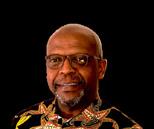
A
South African music,
and elder statesman
have never allowed
once told
have always believed when
must allow
want
be
that's how I have managed to remain
T he legendary Sipho Hotstix Mabuse and the astute Dr Sello Galane join the line-up in Ultimate African Jazz Expe rience at the 23rd instalment of the Joy of Jazz at the Sandton Convention Centre on 25 – 26 November.

Mabuse is set to ascend the Dinal edi Stage to offer a unique celebration of African musical Heritage to present a reimagined iteration of African song forms in vintage Hotstix style.

“Joy of Jazz, The Ultimate African Jazz Experience, is a dream festival for any Musician worth his / her SALT. I always relish participating and per forming in this excellently produced event. I cannot wait for the 26th of November,” said Mabuse.
On the other hand, Dr Galane will ascend the Conga Stage to present a refreshing Free Kiba experience, using a myriad of Alkebulan musical tradi tions. Galane has assembled an inter nationally drawn team of talented musicians from across the continent. Including voices from Ghana, Nige ria, South Africa, and DRC, amongst others.
Hotstix and Dr Galane join a bold and locally focused line-up of artists curated to celebrate the music and talent of African jazz in its various guises.
Dr Galane had this to say about his upcoming performance, “After two and half years of indoor anxiety, come out and root for the Father of Free Kiba music of our continent weave his drum language artistry at the202
“The
chapter of the exquisite Joy of Jazz experience. The ‘Free Kiba Fest in Joy of Jazz’ will rekindle the inner joy of music and the love of life and living
after the gloomy losses of Covid-19. I will bring the Joy of Jazz experience a cut above the rest of the Free Kiba performance."
be joined by dependable drummer Peter Auret and Mihi Matshingana on vocals.
Along with the premier musical offering, festival organisers are pre senting the inaugural 2022 Joy of Jazz “Music and Lifestyle Experience (Expo). The Expo aims to attract 3 000 visitors and over 100 exhibi tors. It is open to both concert and non-concert goers and highlights the festival's focus on economic recovery and development.
The Joy of Jazz Music and Lifestyle Experience (Expo) aims to create and give a platform to brands and busi nesses that form part of the music and lifestyle business value chain to showcase their offerings, and to create a networking environment for the businesses in the context of the Joy of Jazz Festival. – citylifearts.co.za
Tickets
Jazz lovers can join in on the jazz jamboree by purchasing tickets at Computicket or Shoprite and Check ers retail stores.
A ticket to the 2022 Joy of Jazz festival will cost: 1 Day Pass: R750 2 Days / Weekend Pass: R1450
Combo: Joy of Jazz Festival & Joy of Jazz Musical Lifestyle Expo 1Day Pass: R870 Weekend Pass: R1650 Expo Only Day Pass: R120 For more updates go to www.joy ofjazz.co.za
In a rare collaboration, Charl du Plessis will play a double piano col laboration with David Cousin on the second piano. They will notablyIn a video shared by Nigerian chart analytics platform and magazine TurnTable Charts, Recording Academy CEO Harvey Mason Jr said he and other executives, “had a meeting with leaders from the Afrobe ats community…
We had a virtual listening session where we heard from Afrobeats creators and just talked about ‘What are the different subgen res? What are the needs? What are the desires?’” he adds. “And my goal is to represent all genres of music, includ ing Afrobeats, at the Grammys.”
Of course, the category name should it stick could be deemed problematic. Afrobeats, not to be confused with Afrobeat (a musical genre created by Nigerian musician Fela Kuti that fuses funk, jazz, highlife, and traditional African music) is a catch-all term for pop music from Nigeria and Ghana.
As pop music from West Africa gains popularity around the world, the term Afrobeats has become syn onymous with popular African music.
But even the musicians who would generally be under this umbrella, like Burna Boy and Davido, prefer to call their music Afro-fusion or Afro-pop. Let alone the multitudes that would not even scratch the loosest definition of such a category.

He did go on to clarify that the decision is not yet final. “I don’t decide categories,” he explains. “The categories are decided by proposals submitted by members.
The members can say ‘Harvey, I want an Afrobeat category…’ So that process has started now. I think the listening session was very important, very valuable, and a step towards that path.”
An example of how long it takes for categories to become official is when at an April 2021 meeting, the Record ing Academy approved the addition of two new categories in the global and Latin music fields, however, the change did not affect the 2022 Gram mys.
Additionally, the Recording Acad emy announced five additional cate gories this year, including songwriter
of the year and best score soundtrack for video games and other interactive media, which will only take effect at the 2023 Grammys.
Despite the effort to more con cretely recognise and award African music, it is worrying that the Acad emy may not have a clear understand ing of what Afrobeats encompasses and is using it (as the rest of the world is) regardless of region, base characteristics, stylistic markers, or cultural context. Except they as the ‘leading community of music professionals’ should know better.
An article on the institution’s web site states: “The global explosion of Afrobeats has since helped build an important bridge connecting African music genres with American audi ences, specifically Black Americans.”
It goes on to list “five African genres adjacent to Afrobeats'' which they say are Ndombolo (where they feature AliKiba who is known for bongo), Afro Swing/ Afro Bashment (a UK-born derivative of Afrobeat and dancehall), Soukous and Amapiano (a
new sub-genre of South African deep house which is always evolving). If the article is anything to go by, then the academy should take time and resources to create a category that correctly summarises the vibrancy and nuance of popular African music.

As the Academy’s top brass pointed out, the inclusion of non-traditional categories, genres, and artists is dependent on membership.
These creatives and musicians are not only representative of the evolv ing musical landscape but have the unique opportunity to create a last ing impact on the global music com munity.

As part of his annual address to the organisation’s membership body, he drew focus on how the 2022 New Member Class showed the organisa tion’s continued progress toward cul tivating a community that embodies the ethnicities, genres, and crafts that
power the music industry.
“After years of listening, learning, and putting in the work, we’re begin ning to see results of our efforts to diversify the Academy’s membership come to life,” he Mason Jr.
“Our members are the lifeblood of this organisation, powering everything we do from the inside out.
When we have diverse people rep resenting all corners of the industry contributing unique perspectives, progress is achieved at a rapid pace.
The journey is just beginning, and I can’t wait to work alongside our new and existing members to build on the Academy’s commitment to effecting real, meaningful change.”
He reported that of the invitees that accepted their membership invite, 44 percent are from tradi tionally underrepresented commu nities, 47 percent are under the age of 40, 32 percent are women, and 52 percent are male (the remaining 16 percent are comprised of indi viduals who identify as non-binary or chose to not disclose gender).
– thisisafrica.me




Farmers, arguably, have more balls to juggle than operators in other sectors.
The worst part is that these balls are growing and new ones are adding to the com plexity. This is the view of Maluta Netshaulu, a lead ing agricultural economist, banker and foodformzansi. co.za columnist.

Farming is all about planning and executing on those plans within a specific timeframe. A radical deviation from this could spell disaster. Even a famous farming folk phrase, ’n boer maak ’n plan (a farmer makes a plan), might not produce the desired outcomes.
You see, a farmer has to plan what to plant, when to plant, where to source their inputs and by when, when to apply fertiliser, lime, pesti cides and weedicides, when to irrigate (if on irrigated land), and when to harvest. They have a very small win dow to execute on these plans, failing which their yield and income would then start to diminish each day past that window.
Outside of production, the farmer has to coordinate and put in place cer tain measures to secure their income.
The farmer has to take out crop insurance to protect their livelihood against the risks of climate change and natural disasters such as drought, excess rain, hail, fire, etc.
Given that insurance is unafforda ble for most farmers, there is a grow
ing trend of farmers installing other innovative solutions such as hail or shade netting to protect their produce on open land from the elements like hail, frost, birds, and sunburn whilst also improving their orchard perfor mance – quality and yield.
The market price of the crop also has to be hedged. Fixed against the risk of price fluctuation, especially below a threshold, the farmer will start to make a loss. The other risk mitigant that has become more rele vant of late is that against crime.
Here the farmer needs to secure the services of armed response companies and also join local policing forums as well as install surveillance technology within the boundaries of the farming
property to keep their assets, family and workers safe.
Whilst still on the topic of protection of livelihoods, the farming commu nity, especially those that are export orientated like wine and fruits, learnt something valuable during the pan demic. They learnt that diversification of markets is important, and that having some local presence in terms of market is key.
Remember when there was a ban of export produce? The wine sector took a huge hit, but quickly farmers started to adopt digital platforms to sell to the local market. Since then, digital platforms have taken off which helps to put more money in the farmer’s pocket (as these platforms cut out the middlemen), and also helps to open up the market to small and emerg ing farmers thus making the sector inclusive insofar as market access is concerned.
When I was doing my post-grad degree at Stellenbosch University, my professors used to say that the next conflict would be about water. Back then I struggled to understand as water was plentiful and no one really reported on water shortages in residential, industrial or commercial sectors.
Looking back, I now understand and appreciate their foresight and expertise. Water scarcity due to infra structure failure, inefficiency, regula tion and climate change is now the order of the day.
This important resource is now so scarce that the full potential of the sector is being constrained. Luckily,
our farmers are good adopters of tech nology and innovation.
To mitigate the risk of water scar city, they have adopted water efficient irrigation system such as centre pivot, micro, and drip irrigation systems that utilise a fraction of the water previously used by flood irrigation, whilst increasing yields and reducing costs associated with over irrigation and chemical application – a huge win for the farming sector.
The other problem that keeps our farmers awake at night is the risk of energy insecurity. Before 2007, our farmers didn’t have this problem as load shedding was not a thing. In fact, this term was not even part of the South African vocabulary. Yes, there were power cuts here and there, due to faults and theft, which was man ageable. But lately this phenomenon is having serious consequences for the viability of the agriculture sector, food security and job creation.
Remember that famous farming folk phrase of ’n boer maak ’n plan? Well, our farmers are now adopting alternative energy solutions to deal with this problem.
They started with generators but since these are increasingly becoming expensive to operate due to record fuel prices, they are now switching to renewable energy and more spe cifically solar energy – grid tied or off-grid systems.
As if the problems I have outlined above are not enough, farmers also have to produce according to strict production standard such as those of Global G.A.P. which prescribes
the type and quantity of inputs that should be used for the produce to meet food safety and phytosanitary standards. These of course protect the consumers.
And to stay in business, farmers need to produce in accordance with consumer needs in terms of taste, texture, smell, colour, shape and size. Those in the fruit industry attend exhibitions and conferences in Europe and the United States to gain insight on new trends and bring back new cultivars just so they can remain com petitive.
On the issue of fruit size, whilst at a site visit at an apple pack house in Ceres, the manager indicated that in Europe the consumers are now looking for smaller size apples as these are snackable and work very well in kids’ lunchboxes. And on a lighter note she mentioned that that market is also different from ours as those consumers eat fruits for nutrition and not hunger. We might need to unpack this statement in a separate article, but it is worth keeping in mind of the nuances.
The other problem that has started to take shape within the agriculture sector is that of sustainability. The need to produce our food in sus tainable practices and in harmony with nature has become urgent and in other countries new regulations have been put in place to enforce this requirement.
Regulations such as carbon tax for farmers have now been put in parts of Europe to reward farmers who are off setting their carbon footprint whilst penalising those that are not.
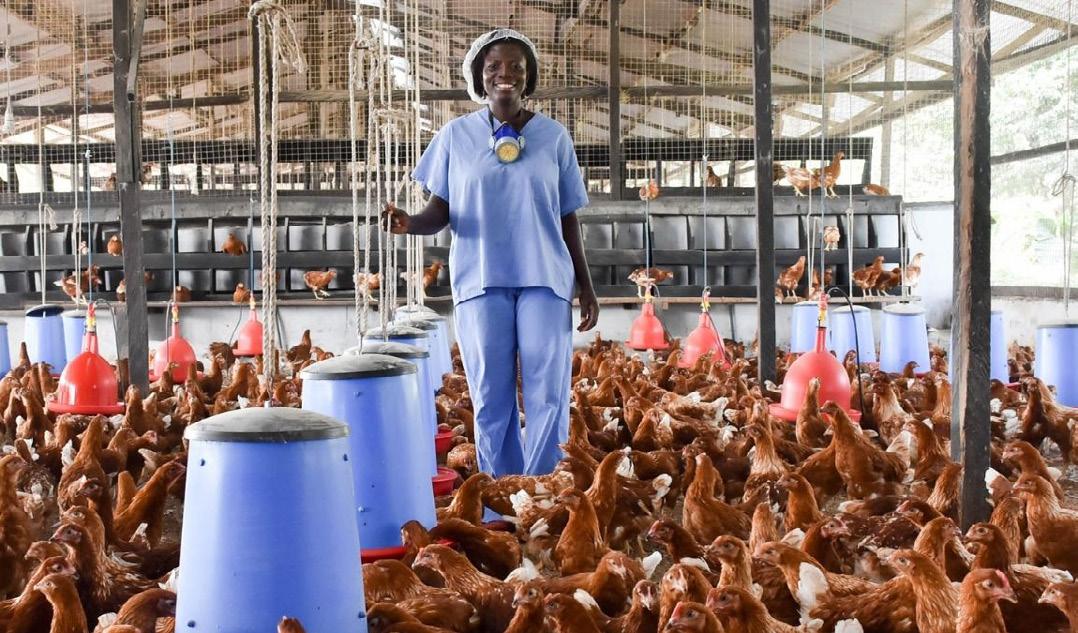
This type of legislation is not yet in place in South African, but there are talks that it is on the way. In terms of when, I don’t know.
But the way in which farmers in those countries and in the US have been approaching this problem is to convert their farming practices to regenerative or conservation agricul ture which are known to sequestrate carbon and land is often always cov ered with crops thus helping to trap carbon as opposed to releasing it. This is easier said than done. I recently read an interesting article and within it a certain phrase stood out for me: “You can’t be green if you are in the red.” This means converting to sustainable production practices needs to make economic sense.
There are also new farming systems such as indoor farming that also help as these systems produce very little carbon as they use a fraction of the resources used in conventional farm ing and no farming equipment like tractors and combines are required.
A successful succession strategy Succession planning is also a big prob lem in the agriculture sector where the average farmer age is just over 60 years. With the number of commer cial farmers (producing 80% of the food) drastically declining every year, the problem of succession planning deserves urgent attention. The reality is that not every child of a farmer is going to aspire to take over the busi ness from their parents.
Some kids aspire to be doctors, engineers, accountants, or agricultural economists working for corporate South Africa, open their own busi
nesses or work abroad. So, what do farmers do in this instance? Well, they have a few options. They can sell to their family members or neighbours upon retirement. Or they can bring in their workers into the business through joint ventures or workers trusts with the aim of passing on full control of the business at a certain point in time. Financial institutions and law companies can help farmers to plan, structure, finance and execute on this. The outcome of these strate gies is that food and job security are then not threatened which bodes well for the country’s requirements espe cially now given the economic growth and unemployment challenges.
These are just some of the issues that our farmers need to contend with daily and every season. There are of course other pain points such as recurring biosecurity threats, dump ing, rising interest rates, escalating production costs and logistical issues, political uncertainty, social unrests, and labour disputes that impact our farmers negatively.
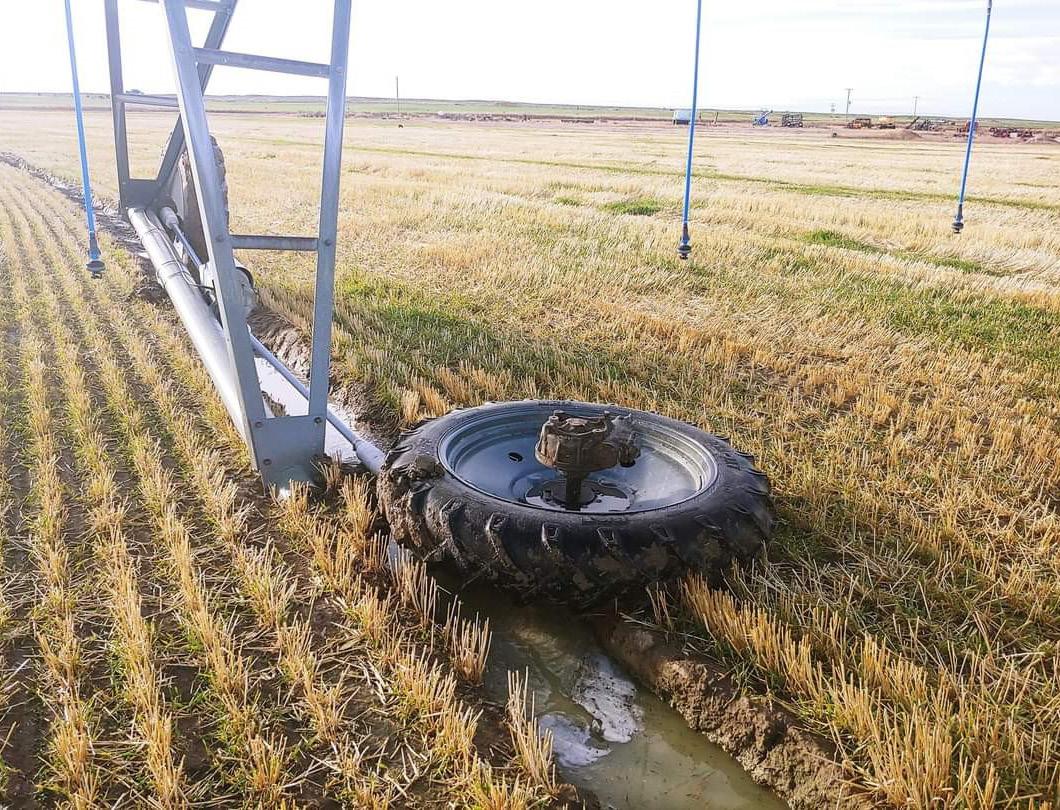
The reality is that smallholder farmers, up-and-coming farmers and new entrants are not spared from these challenges merely on the basis that they are new. They too (need to) battle the same challenges which then necessitates the need for government, government agencies, departments, industry bodies as well as the private sector to work together to support these players all in the effort to sup port food security, job creation and economic growth imperatives.
Now tell me which other sector operators compare or contend with more challenges than those our farm ers contend with? – foodformzansi.
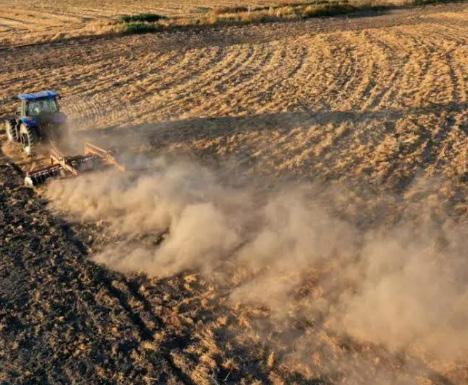
An African team will break the World Cup semi-finals barrier if the continent places more faith in its own coaches, according to Africa's most decorated club coach Pitso Mosimane.
For the first time since the World Cup started in 1930, there will be an all-African coaching cast for teams from the continent at the global finals in Qatar.
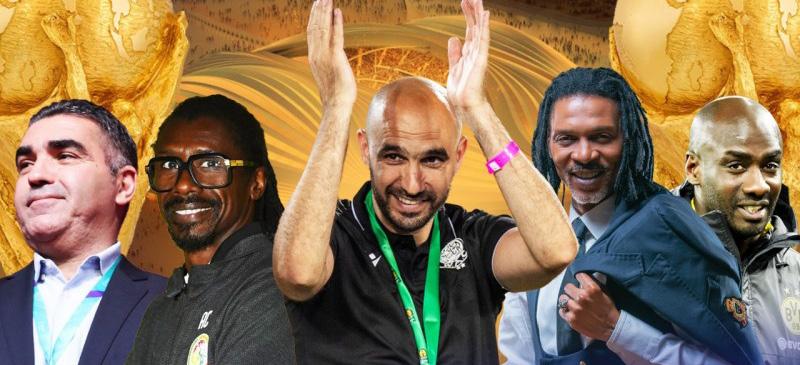
“To have trust in African coaches is massive and shows a great sense of growth on the continent that must be sustained," Mosimane told BBC Sport Africa. This is not a campaign against foreign coaches but applause to the decision-makers in our national associations.
“A lot of people ask why African teams have not gone beyond the last eight or contested for the World Cup title itself, and I believe this is a big step to get there.
“Africa can definitely break that semi-final barrier if we back our own coaches who truly understand the mentality, cultural challenges and methods required to perform.”
Just three African sides have reached the quarter-finals of the World Cup before; Cameroon in 1990 under Valery Nepomnyashchy (Soviet Union, now Russia), Senegal in 2002 coached by Frenchman Bruno Metsu and then Ghana in 2010 with Serbia's Milovan Rajevac.
The debate over a lack of opportu nity for African coaches in their own countries has long been a passionate one, with many believing federa tions tend towards foreigners when appointing a national coach.
But opting for homegrown coaches this time is a significant swing in favour of locals, who have been long overshadowed by coaches from Europe and South America at the finals.
Rise and rise of indigenous coaches Aliou Cisse led Senegal to the Nations Cup title in February and was named
Africa's men's coach of the year in July
There has been a significant rise in the numbers of African coaches making their mark on their own con tinent.
Capped 45 times by Morocco, Regragui took over the Atlas Lions after a successful season in the Moroc can top flight where he led Wydad to the African Champions League and a domestic title.
Former Senegal captain Cisse has been in charge of the Teranga Lions since 2015 and the 46-year-old helped the West Africans to a maiden conti nental success early this year before qualifying them for a second succes sive World Cup appearance.
Kadri, 50, oversaw the defeat of Mali in the play-offs to seal Tunisia's sixth finals appearance after taking charge following their last-16 exit at this year's Nations Cup.
After playing in four World Cups for Cameroon, Song was named the Indomitable Lions coach in February and secured their record eighth quali fication for the global finals following a play-off win over Algeria.
The former centre-back, 46, is set to become the second Cameroonian,
after the late Leonard Nseke in 1994, to guide the Central African nation at the global showpiece event.
Addo played for Ghana at the 2006 tournament, and the 47-year-old took charge of the Black Stars after their group-stage exit from the Nations Cup in January. He led the side to World Cup qualification for the first time since 2014 after beating fierce rivals Nigeria on the away goals rule.
“Our coaches going to the World Cup are qualified and adequately pre pared for the role because it is not beyond their ability,” said Mosimane.
“I know my brothers Aliou and Walid very well because we shared classes during our (Confederation of African Football) Pro licence course. They've both proven themselves on the job and attained the highest coaching certificates as well.
“Rigobert needs no introduction in world football before taking over in Cameroon, while Otto has shown the managerial calmness to lead Ghana. Kadri has done well for Tunisia to get them to the tournament.
“Nothing is impossible in football and because of their foundation and local knowledge, they are more than
capable of leading their respective countries at the World Cup.”
Big boss as the pioneer Stephen Keshi guided Nigeria to the last 16 at the 2014 World Cup, where the Super Eagles lost to France
One of African football's bestknown figures, ex-Super Eagles cap tain Stephen Keshi remains one of only two men to win the Africa Cup of Nations as a player and a coach.
He is the only African to qualify two different nations to the World Cup finals - Togo in 2006 and Nigeria in 2014 - and gained success where Europeans, often employed at great cost, have failed.
At the finals in Brazil in 2014 he led Nigeria to the second round, and Keshi remains the only African coach to appear in the knockout phase of a World Cup.
Keshi, who died aged 54 in June 2016, had hit out at Africa's reliance on foreign coaches, saying it was kill ing the game in Africa and that they are given more time than their native counterparts.
Overall, Africa's premier football event - the Nations Cup - has been won by a local coach on 16 occasions, with foreign coaches triumphing 17 times.

That success rate has equipped Mosimane to dispel long-held beliefs that the status of African coaches remains low and they do not get the same respect from players as a foreign coach.
“What Keshi did by beating foreign managers on his way to continental success was to break that notion of an African coach," he added.
“He also laid the foundation for others to follow. I think his round of 16 achievements also set the tone globally.
“The last two winners of the Nations Cup are Africans [Djamel Belmadi of Algeria and Cisse of Senegal] which shows that most African coaches are as qualified as their foreign counter parts.
“It is ridiculous that people con tinue to hold on to the belief that
only foreigners are good for African teams. These coaches also played for top teams in Europe and elsewhere - they are exposed to modern ideas and deserve the respect of our players, fans, media and other cynics."
Mosimane, 58, led Al Ahly to backto-back Champions League triumphs after joining in 2020, in addition to his previous success in the compe tition with Mamelodi Sundowns in 2016.
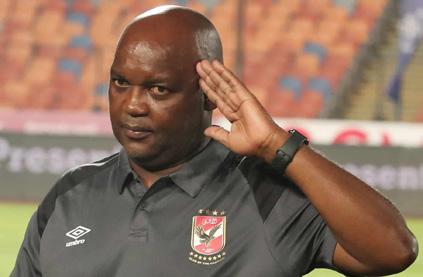
The former South Africa coach also secured two consecutive third-placed finishes at the Club World Cup, including the 2021 edition played in February.
Of the five national sides that rep resented Africa at the 2018 World Cup finals, only Senegal and Tunisia had local coaches - Cisse and Nabil Maaloul.
While no African team made it past the group stage in Russia, Mosi mane believes the continent's sides often suffer from poor preparation and avoidable distractions.
“A coach needs to focus on the tactical and technical aspect of the game and should not be burdened with transportation, hotels and bonus issues,” he added.
“At the World Cup, the national associations must do more to prepare our teams properly and help them avoid distractions and global embar rassments.
“African nations sometimes appoint coaches a few months before a World Cup and expect them to perform miracles. The teams we are competing against prepare well, they invest heavily, are not distracted by little things like bonuses and that is the mentality needed to compete.”
Come 20 November, when the tournament begins, all eyes will be on Africa's quintet of coaches waiting to see if one can make history for the continent and reach the semi-finals.
They have, at the very least, been given the opportunity to succeed on international football's biggest stage. – bbc.com
As African football coaches continue to break new ground, the forthcoming World Cup in Qatar serves as a critical stepping stone. This is why.
By Enock MuchinjoDecide what to call Vahid Hal ilhodžić, between unlucky and controversial, or, as he reckons himself to be, “cursed.” The man from Bosnia has tasted a fair share of success in his football coaching career, guiding four different nations to World Cup quali fication in a space of 14 years.
But Halilhodžić has only actually been to one of those tournaments, with Algeria, who he led to the round of 16 in Brazil in 2014, the North Afri cans’ best finish in the World Cup. On the other three occasions – with Ivory Coast, Japan and Morocco – Halil hodžić was fired just before the World Cup after clashing with the national federations and players. Morocco, the latest country to show Halilhodžić the exit, dismissed the 69-year-old three months before the World Cup kicks off in November in Qatar.
The Moroccan federation cited “divergent visions” for terminating his contract, the final straw being Hal ilhodžić’s dramatic fall out with top players, including Chelsea star Hakim Ziyech who briefly quit international football in protest before agreeing to reverse the decision following the Bos nian’s sacking. Local Moroccan coach Walid Regragui will now be taking the Atlas Lions to the World Cup.
Halilhodzic’s unique misfortune, though, has ushered in a milestone for African football. The five Afri can teams headed for Qatar – Sene gal, Tunisia, Ghana, Cameroon and Morocco – will all be under the tute lage of African coaches, all homegrown.
This is a first in World Cup history, and a challenge for the five men to make a statement not only for themselves, but for African coaches in general.

The five African teams headed for Qatar – Senegal, Tunisia, Ghana, Cam eroon and Morocco – will all be under the tutelage of African coaches, all home-grown
The target is to surpass previous standards, set by coaches from outside the continent, as globally renowned sportswriter David Legge tells This Is Africa
“First, it should be noted that the best three African performances –Cameroon, Senegal and Ghana reach ing the World quarter-finals – were achieved using European coaches,” says Legge.
“That said, it is great that all five Qatar-bound African countries will have local coaches.”
Senegal, Aliou Cisse: Tunisia, Jalel Kadri: Ghana, Otto Addo: Came roon, Rigobert Song: Morocco, Walid Regragui. These are the local coaches that will be in charge of their respec tive countries at the World Cup in Western Asia.
“The likes of Aliou Cisse and (suc cessful South African coach) Pitso Mosimane have raised the profile of
African coaches and they are taken far more seriously now than in the past,” Legge says.
“I am, however, saddened at the sacking of Vahid Halilhodžić by Morocco as he now has the unwanted record of guiding three countries to the finals, then being kicked out on each occasion before the tourna ment.”
Legge – who works for Agence France-Presse (AFP) from South Africa – rates all five coaches differ ently.

“Walid Regragui led Wydad Casa blanca to the 2022 CAF Champions League and Morocco Botola 1 titles and is a worthy successor to Halil hodžić,” remarks Legge.
“Rigobert Song achieved the seem
ingly impossible, winning in Algeria with Cameroon (in the World Cup qualifiers), so good luck to him .Otto Addo with Ghana; they were given no chance against Nigeria (in the qualifiers), a view endorsed after being held at home in the first leg. To draw in Abuja was a fantastic achievement.
“Cisse has steadily built Senegal into a powerhouse and the general view is that the Teranga Lions are probably the best hope of African success, although they underesti mate hosts Qatar (in the next pool match) at their peril.
It is difficult to judge Tunisia coach Jalel Kadri as he has had only two matches in charge – winning away and drawing at home against Mali in the play-offs. Tunisia have consistently performed poorly, two wins in 15 matches, at the World Cup, so he faces a major challenge.”
Prominent Harare-based Super Sport football commentator and BBC journalist Steve Vickers also views the upcoming World Cup as a water shed moment for African football coaches.
“This is a really positive situa tion for African football, it is high time that Africa did invest in African coaches, rather than bring in foreign coaches who usually are paid much more than their local counterparts,” Vickers tells This Is Africa
“Aliou Cisse, I think has led the way with his great achievements with Senegal, so he has done a lot of work for this cause of African coaches getting a better chance. For Morocco, very interesting, this coming from the government’s investment and they decided to take a risk and they fired Halilhodžić with not very long to go before the World Cup.
And with Regragui being so young, it’s a risk that they have taken there, and a show of confidence in some regards.
“But I think that was a surprise move, I would have to say, although Halilhodžić wasn’t getting along with Hakim Ziyech and others as well. For Cameroon, I think they have taken too much of a risk there with Rigob ert Song. I’m not convinced that he has the necessary experience for the World Cup and nonetheless he has delivered for them so far.
“So it’s a really positive situation so far, and I hope that in these five African coaches we will see some level of progress at the World Cup in terms of getting out of the group stages after all five teams didn’t make it the last time (in 2018 in Russia).”
Definitely something to look for ward to in Africa, as the World Cup draws to a close. – thisisafrica.me
● Morocco’s Walid Regragui (l), Tuni sia's Jalel Kadri (middle) and Ghana ian coach Otto Addo (r) will be in charge of their respective countries at the World Cup in Qatar.
● South African Pitso Mosimane, the best coach on the African continent today.